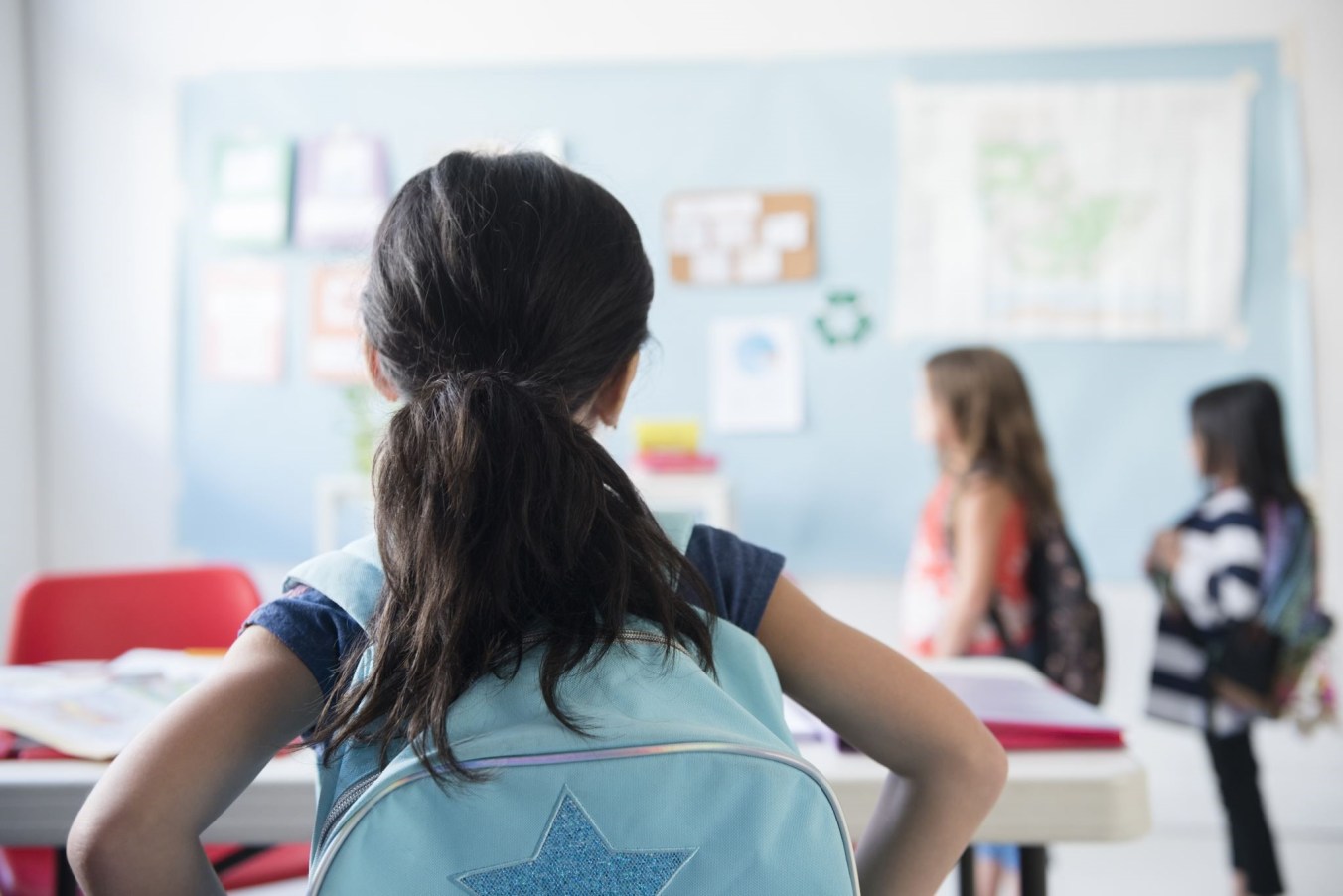We would walk the length of the playground, Rosa and I. Arms around each other’s waists, strutting lockstep through the weeds, sand, and sparse tufts of seasonal grass sprouting beyond the monkey bars and seesaws. I was a head taller and about twelve shades paler. A gangly strawberry blonde against my brown-skinned best friend.
We partnered in kickball games, cheering and clapping and fighting each other’s battles. We held hands and hopped feet-first into the swirling double jump ropes, never missing a beat. We staked our claim in the corner of the playground under six sky-high pines and hand-raked piles of straw into larger-than-life boxes and rectangles that became our living rooms, bedrooms, and kitchens.
One day we dared each other to peek through the vents on the sides of the school building into the thick, moldy darkness of the imagination-fueled underworld that lived and breathed beneath the large, very old brick building that housed our elementary school—perhaps foreshadowing something neither of us could fathom.
It was gone before I knew it, whisked away like wisps of eye-stinging smoke, thrusting me into a whirlwind of confusion and sadness. Rosa stopped being my friend one day, just as quickly as she had become my friend. She wouldn’t look at me, talk to me, sit next to me. She was as indifferent to me as she was to the piece of chalk she rolled back and forth in her hands, waiting her turn to write run and jump and play on the blackboard for our whole first grade class to observe.
My mother explained to me, as best she could, what had happened, but she told me not to worry, that I could still play with Rosa all I wanted. Then my very perturbed mother had a serious chat with my misguided teacher—teacher to teacher, peer to peer—just to set things straight. But the damage, unfortunately, was done. My teacher had already laid down her own law to Rosa’s parents, who obviously took her very seriously and perhaps feared the consequences of noncompliance. They told their daughter that she was no longer allowed to play with me. Me, the Anglo. Rosa, the Mexican.
Even with a childhood rooted in 1950s small-town Texas with its segregation and stereotypes, I had begun the first grade with only a tiny notion that superficial differences mattered a whole lot more than things that really should matter in life, like making friends, being good neighbors, showing a little kindness and consideration. I had parents who treated everyone pretty much the same, were good friends and good neighbors themselves, helpful and compassionate and generous. I learned by example.
I looked up to my parents, but I looked up to my teachers as well. One of the very first teachers in my life had taught me that a little girl whose parents had been born in a different country was not allowed to be my friend. By the time I was old enough to understand all the complexities, I was old enough that it no longer mattered. I had moved on. Rosa was long gone from my world, as was the thought of such a friendship.
After college I chose to live in Houston’s multinational melting pot in a very mixed neighborhood—jumbled with ages, nationalities, skin colors, occupations, financial wherewithal, nontraditional family arrangements, and other such descriptors that really should not matter. Yet there was a clear separation for me, having that little seed of influence, of doubt in my head from all those years ago. I was neighborly, but hesitant. I was comfortable existing on the same street, but never mixing, never getting too close.
Then one day, across a backyard fence, with the glorious aroma of smoked chicken tickling my senses, I was asked if I might possibly spare a few of the large banana leaves from my two dozen trees, the trees I hated, the ones for which I’d paid good money, after just about every winter I’d spent in the house, to have their stinky, rotten carcasses ripped out of the ground and carried off to absolutely no good. They always returned in the spring, just to spite me. Hack away, I said.
The uncle who was visiting from Mexico arrived at my back door with his well-worn machete, ready for work. Ooh, he tells me, as he surveys my crop. You do not take care of trees. Take care? He whacks and trims and rips and digs for more than an hour and piles up not only his twenty or so big banana leaves for cooking but the dried-up, outer layers of banana-tree skin and other stuff that he tells me is not good. Not good for what? This he bags up and throws in my garbage can on his way out.
A few hours later, with Mariachi music drifting about, I receive a heartfelt invitation across the same fence to a little boy’s birthday party. After all, I was a neighbor, and I had generously given my banana leaves. Plenty of food, they said, smiling brightly.
I bought and wrapped a small gift and made my way around the block into their colorfully decorated backyard packed with family. I ate a plateful of tamales and drank too much Sangria. Then about two dozen children took turns donning a blindfold and whacking the guts out of a piñata that became increasingly ragged until the birthday boy stepped up to the plate and his father lowered it to a just-right, king-for-the-day level.
For a minute or two, it rained dollar bills in the backyard of my neighbors, with kids and grown-ups scrambling and squealing and stuffing the paper treasures into their pockets and down their blouses. I left with both my stomach and my heart full.
About a month or so later, I noticed a heavenly, sweet aroma floating through my backyard garden. Not thick and clingy like gardenias, but light and airy, almost tropical… bananas. My unwanted, unloved banana trees were healthy, flourishing, and blooming—huge, red-colored, droopy, teardrop-shaped flowers—with dozens of baby bananas just starting to pop out above. Uncle was right. I do not take care of trees.
Many weeks later, I knocked on their door to share my crop, smiling brightly and thanking them for their uncle’s help with the trees. They thanked me as well. As I walked back around the block to my house, I was reminded of what my parents had taught me so many years ago—that being a good friend, a good neighbor, has nothing to do with what makes us different.
And then suddenly, out of nowhere, I was reminded for the first time in decades of my little friend Rosa. I had sealed her and our brief friendship in a box and stuffed it far away in the back corners of my mind, but now she was happily hop-scotching and rope-jumping her way back into my heart. With a twinge of regret and sadness, I wonder what might have happened to her, what her life was like. Was she married? Did she have children?
A few days later, I found Rosa in our high school yearbook, but with the junior class, not the senior class. She didn’t graduate when she should have, and that not only surprised me but saddened me deeply. What had happened?
I can’t help but also wonder what might have been—without the unwarranted intervention of my teacher—if we had been allowed to embrace our differences as children so easily do instead of using them like a knife to separate us.
With flashbacks to the innocent dare we shared as little girls, I feel as if I were being pulled toward that darkness once again, peering into the smelly underworld beneath the school building where all bad dreams, disappointments, and unfulfilled wishes lie.



2 thoughts on “Playing With Rosa”
As always, well written and worth reading. You have a gift. Thank you Chris.
Thanks so much, Doug!